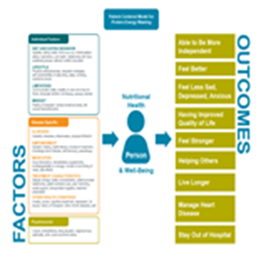
Invention Summary:
Protein-energy wasting (PEW) is a term proposed by the International Society of Renal Nutrition and Metabolism (ISRNM), referring to the multiple nutritional and catabolic alterations that occur in patients suffering with chronic kidney disease (CKD). To increase awareness, identify research needs, and provide the basis for future work ISRNM has recommended the nomenclature of PEW and formulated a model that theorizes etiological factors which may negatively impact nutritional status and contribute to morbidity and mortality.
The ISRNM PEW model is based on a comprehensive synthesis of available research but fails to integrate the patient’s perspective. Integrating the patient's voice into research prioritization is essential for solving problems that patients care the most about in terms of health, symptom management, and survival. Our central hypothesis is that PEW negatively influences the experiences and health of patients on dialysis. Rutgers researchers used deliberative processes for adapting the ISRNM PEW model to one that includes stakeholder priorities, addressing gaps from the initial model concept.
Using the stakeholder engagement framework developed by the Patient-Centered Outcomes Research Institute, researchers at Rutgers developed a patient-centered model for PEW, representing a testable model for researchers that incorporates the patient’s voice. This patient-centered model can serve to inform researchers, clinicians, and patients as to potential methods for studying how to prevent or treat PEW and improve patient outcomes.
Market Applications:
- Use by prospective investigators for comparative clinical effectiveness research (CER) using a patient-centered outcomes research approach.
- Use by clinicians as part of a treatment algorithm, or as a guide to clinical decision-making, addressing other factors that stakeholders rated as essential for reducing risk for PEW and for improving patient outcomes.
Advantages:
Stakeholder engagement is critical for ensuring that comparative effectiveness research and its conduction remain patient-centered. Garnering this insight should assist in the prioritization of projects for maximal value to patients and their families by future investigators. We feel this model will have a substantive impact on the direction and outcome of nutrition research in chronic kidney disease.
Intellectual Property & Development Status: Available through license or distribution agreement.
Click Here to Learn More about This License